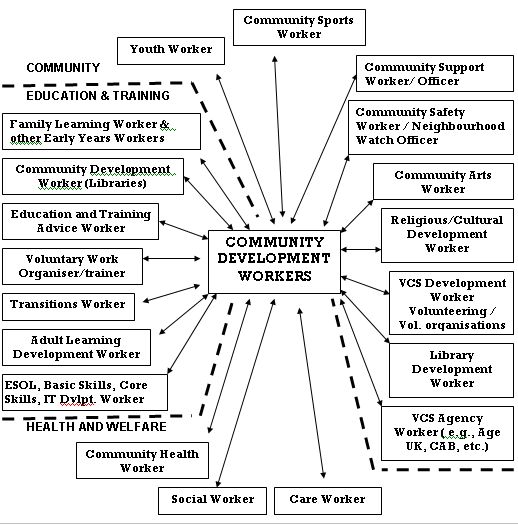Community Learning Development Resource 601-10
COMMUNITY DEVELOPMENT WORKERS – WITH THE POTENTIAL FOR LEARNING CONNECTIONS
SUMMARY
A variety of different workers seem to work with people in local communities and neighbourhoods in ways that are broadly contributing to local community development and which engage local people in learning. A range of worker roles are identified in this resource (601-10), from local worker forums and development and training workshop sessions. The broad implications for co-working and community learning are explored.
Naming the worker roles
The naming of workers and their jobs within community settings is not an exact science. They may be named variously as workers, officers or staff – sometimes with ‘development’ added to their title. The agency, service or community context may be part of their title, as well an indication of function or purpose. The result is that a worker can meet many other differently named workers, needing to explore and understand what exactly they do, in order to be able to build with them, effective working relationships. Job titles and roles are also significantly a source of confusion for people in communities and neighbourhoods. Who does what and who should I turn too becomes a major issue for lay people.
Many workers find themselves repeatedly explaining what it is they do whilst trying to see connections with other workers or to establish their credibility with agencies and communities. It is possible that two workers with different job titles can find themselves having almost identical roles and functions.
A lack of a universally accepted framework (a taxonomy) for community development work roles and functions is a problem, further confusing practice situations where in good times, multiplicity of funding and roles can lead to project worker saturation on the ground and competitive working by workers and agencies. All very confusing for local people!
Discovering the workers
Who have we come across whilst networking in support of our community development work in local communities and neighbourhoods? Who might have something to contribute to local community development, regeneration and capacity building?

Agencies and services have other workers, who may contribute to community development but have a less obvious role in this. For example within the Health Service there are GP surgery staff and elsewhere, the Police; Housing officers and workers; Benefits office staff, teachers, etc.
The nature of community development work is that it touches the lives of so many people and the work of so many services and agencies, statutory and voluntary. Shared understanding of the work and how roles and functions connect into it is important. The limit to this may firstly be for workers on the ground, to seek shared understanding, on the basis of opportunity and fitness for purpose, as the need arises in practice. This may be achievable between workers, but is significantly more difficult between agencies and services.
PROMPTS FOR REFLECTION AND DISCUSSION
- This collection of ‘community development’ roles is by no means exclusive. Job titles and descriptions are wide ranging:
- Are there others?
- What are the implications of the variety of titles, etc., for worker and for learners?
- It has become evident through research into the training and development needs of workers and managers in relation to ‘community learning development’, that workers generally do not have a shared understanding of the variety of work roles. How might this be built up?
- There may also be a lack of understanding of the crucial importance of shared community development understandings and connections within Local Strategic Partnerships, Locality Partnerships, Community Strategies, etc., and relevant local organisations and agencies. How can this be addressed?